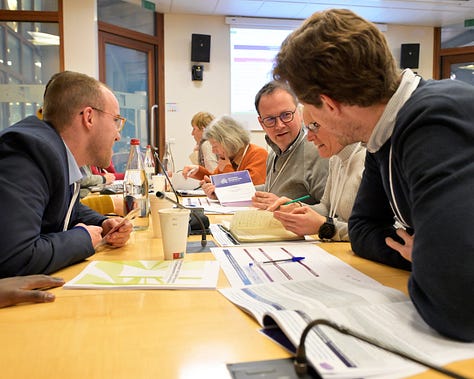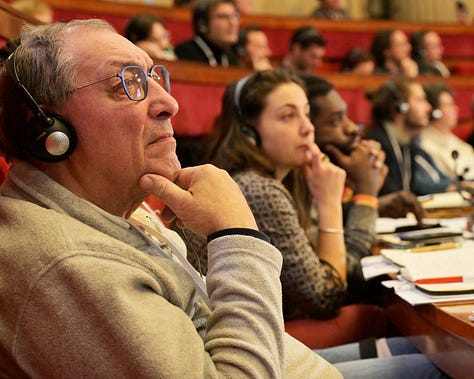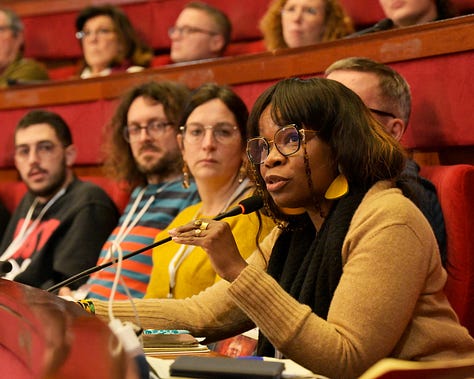How Non-Expertise Becomes a Strength
Hugh Pope reports from France



One criticism sometimes leveled against Citizens’ Assemblies is that meetings of randomly chosen ordinary people cannot decide on complex policies because they are not “experts”.
For the past two months, I’ve been observing France’s second major Citizens’ Assembly, dealing with end-of-life issues and assisted death. I hope the critics have a chance to sit in on an assembly as I have, because the diligence and intelligence of the participants are the first qualities that strike any witness.
One citizen participant said as much on the eighth day of the assembly. “You’ve told us about all the criteria for choosing us [sex, age, urban/rural context, region, education, socio-professional category], but you missed one out: brain power!” The point was met with rousing applause from the wider group.
Professional experts make presentations to the assembly, of course. In early sessions, well-spoken leaders of the six major religious faiths spoke in favor of maintaining France’s current ban on assisted death. Then came six representatives of other “spiritualities” – freemasons, philosophers, human rights defenders – who just as definitely all agreed that some form of assisted death should be allowed. Other experts included matter-of-fact practitioners of assisted death in Belgium and Switzerland, civil society leaders, palliative care volunteers, the president of the council of medical ethics, and so on.
(Most of the presentations can be seen on the assembly website run by the lead organiser, Le Conseil économique, social et environnemental, or CESE).
“I feel like I’m more confused than I was when I came,” one retired citizen admitted over dinner after another long day at the Palais d’Iéna, the CESE’s headquarters near the Eiffel Tower in Paris.
This confusion is, in fact, an advantage that amateurs hold over experts. Precisely because of their narrow specialisation, or their particular community platform, no expert or civil society leader could give a full, credible and legitimate answer to the question about what should be done about assisted suicide for everyone in France. The amateur citizens, unlike, say, politicians or NGO leaders, have no need to take a position in the hope of gaining support from voters or financiers.
This freedom of conscience seemed to include being free from ideology: an initial show of hands revealed that few citizens had a firm position on end-of-life issues before joining the assembly. As one of the experts told the citizens, there is actually no right answer to such moral questions; the assembly should simply propose what it thinks is best for now.
But how should the 184 citizens who make up the assembly make sense of their confusion—and, in the end, reach some form of consensus?
Facilitators help to guide the process. They remain neutral about the issue at hand, yet expert enough to help the discussion move forward without violating the principle that the citizens are the ones in charge. The facilitators were clearly enjoying the experience of working with ordinary citizens, rather than with professionals long convinced that their views are right.
“This assembly is unusual for me,” one facilitator told me. “Usually, I am facilitating for people who are experts. But here I found that amateurs are really good at deliberating things. They bring such a variety of real-life experience.”
Every facilitator has their own style: gentle and encouraging, charming and smooth, jokey and camp. After an unusually unruly deliberation, one facilitator closed the meeting, clapped his hands on the desk with a half-sardonic cry of “Vive la République! Vive la France!” and got up asking who’d seen his “clopes”, his cigarettes. That successfully defused any lingering tension, freeing people to move on and out for coffee in the corridor.
“People are invested. They are working hard. There is a sense of common ground emerging,” one citizen, a teacher, told me. “We do feel like that [the organisers] are trying to steer us towards ideas and away from policies. But even if they own the process, I also feel that we own those ideas.”
Another facilitator passed around cookies and croissants after an exhausting two-hour discussion, instilling a sense of calm and recharging the batteries of the members.
“Normally, I help people in making presentations to boards,” one facilitator said. “But I find there’s no real difference between citizens, professionals and experts, except that the citizens tend to feel freer to express what they actually think… This kind of democracy has a future.”
Before the third session, the leader of the Assembly’s governing council, Claire Thoury, stepped up to remind the citizens that they should rein in their instinct to become full-on experts themselves.
“We understand your feelings, of being researchers wanting more and more facts, more and more interviews, before reaching your conclusions. I just want you to know that this a normal feeling, but giving into it can hurt you,” Thoury said.
Thoury returned to the theme in a video after the third session finished. “The quest for absolute knowledge is praiseworthy and complicated to achieve. At the same time, you’ve got to get going, to start deliberating. There are six sessions left and they will pass by very fast.”
Indeed, the citizen members are intensely committed to gathering enough information to move past their confusion, and to ultimately developing thoughtful recommendations that will serve the wider society in a just way. Many are already worrying about whether—after all of their mental labor—the government will even act upon their recommendations. One attendee wondered whether Citizens’ Assemblies risk becoming the democratic equivalent of greenwashing, or “civicwashing.”
That remains to be seen. But what is clear is the unique ability of citizens in a deliberative assembly to be “freer,” as the facilitator observed. That is, to be open-minded and begin to settle through deliberation on conclusions that are not biased to any pre-existing faction, and yet extremely well-considered.
In an age where ordinary people are often derided as naive or passive victims of “disinformation,” turning the non-expertise of millions of citizens into a strength, not a weakness, could be an important key to democracy’s future.
Hugh Pope is an advocate for democratic renewal through sortition and is currently preparing for publication on 7 March 2023 his late father Maurice Pope’s book The Keys to Democracy: Sortition as a New Model for Citizen Power. He sits on the Board of Advisers of DemocracyNext. He is a former international correspondent for The Wall Street Journal and author of books on Turkey, the Middle East and Central Asia.



I like to read about the testimonies of facilitators themselves. It's great to see them getting on board
Thank you for sharing this energising and wonderful description of a Citizens’ Assembly process. I yearn for the day when this is common practice.
Reading the newsletter, I found there to be many similarities with Nora Bateson's 'Warm Data Labs'. A Warm Data Lab is a group process, "which illustrate[s] interdependency and generate[s] understandings of systemic patterns for people with no previous exposure to systems theory. As a tool for revealing relationships that are integral and woven into the complex fabric of the issues we are working on, the Warm Data Lab process allows participants to see new patterns, new causations, and to respond to them with a much broader comprehension. In this way, the Warm Data Lab enables new societal responses to complex challenges."
Bringing 'ordinary' people together to deliberate and share from their life experiences, without preconceived agendas or biases, and to embrace confusion, these are powerful practices.